 Disco Mix Club Records releases a Back To Mine compilation album picked by Norwegian duo Röyksopp.
Disco Mix Club Records releases a Back To Mine compilation album picked by Norwegian duo Röyksopp. ![]()

 Disco Mix Club Records releases a Back To Mine compilation album picked by Norwegian duo Röyksopp.
Disco Mix Club Records releases a Back To Mine compilation album picked by Norwegian duo Röyksopp. ![]()
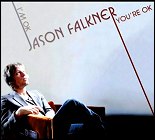 Japanese label Noise McCartney Records releases the album I’m OK, You’re OK by Jason Falkner, the ex-Jellyfish guitarist’s third solo album.
Japanese label Noise McCartney Records releases the album I’m OK, You’re OK by Jason Falkner, the ex-Jellyfish guitarist’s third solo album. ![]()
 Hear Music releases the Paul McCartney solo album Memory Almost Full, featuring the single “Ever Present Past”.
Hear Music releases the Paul McCartney solo album Memory Almost Full, featuring the single “Ever Present Past”. ![]()
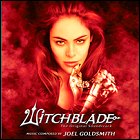 Free Clyde Music releases Joel Goldsmith‘s soundtrack from the TV Series Witchblade.
Free Clyde Music releases Joel Goldsmith‘s soundtrack from the TV Series Witchblade. ![]()

 Story: In a revised and expanded edition of this band-authorized biography, music writer Tony Fletcher recounts how Bill Berry, Peter Buck, Mike Mills and Michael Stipe made their way to Athens, Georgia in the late seventies and formed a band to play at a friend’s birthday party. Eventually adopting the name R.E.M., the band became leaders in the college/alternative rock movement of the 80s and broke through to enormous worldwide success in the 90s. Fletcher tracks their story through Berry’s departure in 1997 and Buck’s acquittal in a British air rage trial 22 years to the day after their first performance.
Story: In a revised and expanded edition of this band-authorized biography, music writer Tony Fletcher recounts how Bill Berry, Peter Buck, Mike Mills and Michael Stipe made their way to Athens, Georgia in the late seventies and formed a band to play at a friend’s birthday party. Eventually adopting the name R.E.M., the band became leaders in the college/alternative rock movement of the 80s and broke through to enormous worldwide success in the 90s. Fletcher tracks their story through Berry’s departure in 1997 and Buck’s acquittal in a British air rage trial 22 years to the day after their first performance.
Review: Fletcher does a great job of collecting details of the band’s recording, touring and other activities and forming them into a coherent narrative that spans more than two decades. I personally enjoyed the earliest chapters the most, because Fletcher is so effective at bringing those days to life. He quotes Peter Buck as saying “I just figured that you’d meet the right people, then you’d get in a band, then you’d make the good music, and people would come and see it.” Buck makes it sound ludicrously easy, and yet that’s what R.E.M. made happen, thanks to talent, a lot of work, and a fair amount of being in the right place at the right time. I can only imagine what it was like to live that lightning-in-a-bottle experience, but simply reading about it in “Remarks Remade” is exciting in itself.
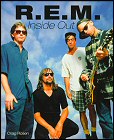
 Story: Journalist Craig Rosen collects anecdotes and information about every song on R.E.M.’s albums from 1981 through 1996. Rosen draws on his own interviews with the band plus many of the articles and books on the band in print at the time to talk about production techniques, instrument lineups, lyrical inspiration and other tidbits. Heavily illustrated.
Story: Journalist Craig Rosen collects anecdotes and information about every song on R.E.M.’s albums from 1981 through 1996. Rosen draws on his own interviews with the band plus many of the articles and books on the band in print at the time to talk about production techniques, instrument lineups, lyrical inspiration and other tidbits. Heavily illustrated.
Review: There are a number of good books about R.E.M., so at first glance it might seem like this relatively short, photo-laden book is superfluous. But its subtitle suggests the niche that Rosen has managed to find and fill quite well. Every song gets at least a few lines of discussion, and many get considerably more. Some of the detail is probably best suited to the hardcore R.E.M. trivia fan who’s interested in things like the source of the siren wail on “Leave,” or why Buck plays drums on the 11th untitled song from Green. On the other hand, someone not fully immersed in the band’s lore might appreciate this quick history that focuses primarily on the band’s recording career (as opposed to live performances, work with other artists, personal biographical information, or political activism, to name a few topics covered in detail elsewhere).

 Story: In a thematically organized set of lists and essays, the author provides historical information and analysis of R.E.M.’s career from its members early musical activities through the band’s 1995 world tour.
Story: In a thematically organized set of lists and essays, the author provides historical information and analysis of R.E.M.’s career from its members early musical activities through the band’s 1995 world tour.
Review: Last updated in early 1996, “It Crawled from the South” suffers somewhat from unfortunate timing. It is by now several years out of date, and it just narrowly misses the natural close point of Bill Berry’s retirement. As a result, certain comments come off as dated, such as the author’s speculation that Peter Buck’s decision to move from Athens to Seattle in 1992 might ultimately sink the band. But the book is a storehouse of trivia and information about not only the band but those people and places that intersected with R.E.M.’s path over the years. One chapter discusses collaborators and contemporaries, another maps out the clubs and hangouts where the band played its first shows. There are comprehensive lists of the band’s songs, both released and unreleased, along with the occasional pointer to well-known bootleg collections. Many television and promotional appearances are listed, and Gray tracks the development of the band’s video aesthetic from the grainy low-fi oddities like “Radio Free Europe,” “Driver 8” and “Fall on Me” to the high production values of “Losing My Religion,” “Everybody Hurts,” and the glitzy rock star clips from Monster.

 Story: This compendium collects every item that appeared in Rolling Stone magazine concerning R.E.M. from 1981 to shortly after the release of Monster in 1995. Album reviews, cover stories, interview features, Random Note mentions and year-end Best Of lists are included, along with a new introduction by writer Anthony DeCurtis.
Story: This compendium collects every item that appeared in Rolling Stone magazine concerning R.E.M. from 1981 to shortly after the release of Monster in 1995. Album reviews, cover stories, interview features, Random Note mentions and year-end Best Of lists are included, along with a new introduction by writer Anthony DeCurtis.
Review: I checked this book out of the New York Public Library shortly after reading of Bill Berry’s retirement; with the sense that an era was ending, I wanted to try and vicariously experience its beginning. There are a number of fine books on the band on the market, but all of those have the advantage of hindsight to lend perspective and structure to their narrative. The advantage of this book – which most of those other works cite as an enormously helpful reference – is that the story is being written as it happens; neither the band nor the writers know where things are going, so there’s an immediacy and occasional unintended irony as the band’s stature and career evolve. The album reviews and feature stories, by a variety of writers, all have an impressive level of depth, thoughtfulness and clarity – you can see why the band developed a rapport with the magazine, and how that pays off in the quality of the magazine’s coverage.
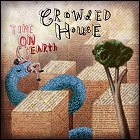 Capitol Records releases the fifth studio album by Crowded House, Time On Earth, featuring the single “Don’t Stop Now”. This album reunites the surviving members of the original lineup plus new drummer Matt Sherrod.
Capitol Records releases the fifth studio album by Crowded House, Time On Earth, featuring the single “Don’t Stop Now”. This album reunites the surviving members of the original lineup plus new drummer Matt Sherrod. ![]()
 Varese Sarabande releases Christopher Franke‘s soundtrack from the direct-to-video movie Babylon 5: The Lost Tales.
Varese Sarabande releases Christopher Franke‘s soundtrack from the direct-to-video movie Babylon 5: The Lost Tales. ![]()
 8-Bit Weapon releases the EP Mean Time at the 2007 Classic Gaming Expo.
8-Bit Weapon releases the EP Mean Time at the 2007 Classic Gaming Expo. ![]()
 Yep Roc Records releases Liam Finn’s debut solo album I’ll Be Lightning, featuring the singles “Better To Be” and “Gather To The Chapel”.
Yep Roc Records releases Liam Finn’s debut solo album I’ll Be Lightning, featuring the singles “Better To Be” and “Gather To The Chapel”. ![]()
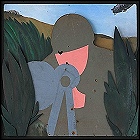 Atavistic Records releases The Complete Machine Gun Sessions by the Peter Brötzmann Octet, chronicling the recording of the group’s 1968 album.
Atavistic Records releases The Complete Machine Gun Sessions by the Peter Brötzmann Octet, chronicling the recording of the group’s 1968 album. ![]()
 Through his own website, composer Dennis McCarthy releases his episode scores from the TV series Sliders; this remains the only release of any music from that series.
Through his own website, composer Dennis McCarthy releases his episode scores from the TV series Sliders; this remains the only release of any music from that series. ![]()
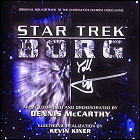 Through his own website, Star Trek composer Dennis McCarthy releases his score from the computer game game Star Trek: Borg, co-composed with Kevin Kiner (Star Wars: Rebels).
Through his own website, Star Trek composer Dennis McCarthy releases his score from the computer game game Star Trek: Borg, co-composed with Kevin Kiner (Star Wars: Rebels). ![]()
 Warner Bros. Records releases Steve Jablonsky‘s soundtrack from the live-action Transformers movie.
Warner Bros. Records releases Steve Jablonsky‘s soundtrack from the live-action Transformers movie. ![]()
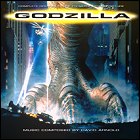 La-La Land Records releases a long-awaited expanded edition of David Arnold‘s soundtrack from the American-made 1998 Godzilla movie.
La-La Land Records releases a long-awaited expanded edition of David Arnold‘s soundtrack from the American-made 1998 Godzilla movie. ![]()
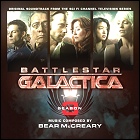 La-La Land Records releases Bear McCreary’s soundtrack from the third season of Sci-Fi Channel’s Battlestar Galactica reboot. The third season soundtrack CD includes the fan-requested Galactica version of Bob Dylan’s “All Along The Watchtower”, which has become integral to the storyline.
La-La Land Records releases Bear McCreary’s soundtrack from the third season of Sci-Fi Channel’s Battlestar Galactica reboot. The third season soundtrack CD includes the fan-requested Galactica version of Bob Dylan’s “All Along The Watchtower”, which has become integral to the storyline. ![]()
 Silva Screen Records releases a CD of Murray Gold’s soundtrack music from the third season of new Doctor Who. Most of the music comes from the mid-season two-parter Human Nature / The Family Of Blood and the three-part season finale, Utopia / The Sound Of Drums / Last Of The Time Lords.
Silva Screen Records releases a CD of Murray Gold’s soundtrack music from the third season of new Doctor Who. Most of the music comes from the mid-season two-parter Human Nature / The Family Of Blood and the three-part season finale, Utopia / The Sound Of Drums / Last Of The Time Lords. ![]()
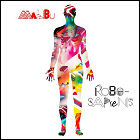 Expansion Team Records releases the album Robo Sapiens by Malibu (a pseudonym for former Jellyfish member Roger Joseph Manning Jr.); the album was released several months earlier in Japan.
Expansion Team Records releases the album Robo Sapiens by Malibu (a pseudonym for former Jellyfish member Roger Joseph Manning Jr.); the album was released several months earlier in Japan. ![]()
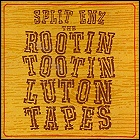 Rhino Records releases the album The Rootin’ Tootin’ Luton Tapes by Split Enz, a collection of demos, alternate takes, and unreleased songs recorded during the band’s infamous lost year in the U.K. A special fan club edition adds an entire extra disc of material.
Rhino Records releases the album The Rootin’ Tootin’ Luton Tapes by Split Enz, a collection of demos, alternate takes, and unreleased songs recorded during the band’s infamous lost year in the U.K. A special fan club edition adds an entire extra disc of material. ![]()
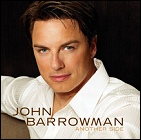 A veteran of the musical stage on both sides of the Atlantic, Doctor Who/Torchwood cast member John Barrowman‘s album Another Side is released.
A veteran of the musical stage on both sides of the Atlantic, Doctor Who/Torchwood cast member John Barrowman‘s album Another Side is released. ![]()
 Epic Records releases an expanded, remastered edition of the Alan Parsons Project‘s 1978 album Pyramid, with additional tracks from the original recording sessions.
Epic Records releases an expanded, remastered edition of the Alan Parsons Project‘s 1978 album Pyramid, with additional tracks from the original recording sessions. ![]()
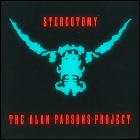 Epic Records releases an expanded, remastered edition of the Alan Parsons Project‘s 1985 album Stereotomy, with additional tracks from the original recording sessions.
Epic Records releases an expanded, remastered edition of the Alan Parsons Project‘s 1985 album Stereotomy, with additional tracks from the original recording sessions. ![]()
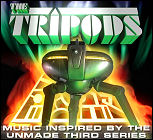 BBC Video releases, as part of the DVD box set The Tripods: The Complete Series, Ken Freeman’s notional soundtrack for Tripods: The Pool Of Fire, the unmade third season of the BBC’s 1980s sci-fi series The Tripods.
BBC Video releases, as part of the DVD box set The Tripods: The Complete Series, Ken Freeman’s notional soundtrack for Tripods: The Pool Of Fire, the unmade third season of the BBC’s 1980s sci-fi series The Tripods. ![]()
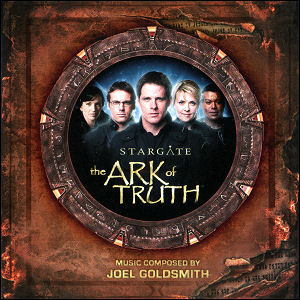 Free Clyde Records releases Joel Goldsmith’s soundtrack from the TV movie Stargate: Ark Of Truth.
Free Clyde Records releases Joel Goldsmith’s soundtrack from the TV movie Stargate: Ark Of Truth. ![]()
 Epic Records releases an expanded, remastered edition of the Alan Parsons Project‘s 1980 album The Turn Of A Friendly Card, with additional tracks from the original recording sessions.
Epic Records releases an expanded, remastered edition of the Alan Parsons Project‘s 1980 album The Turn Of A Friendly Card, with additional tracks from the original recording sessions. ![]()

 Story: Professor Peter Schickele charts the life and career of P. D. Q. Bach, the twenty-first of famed composer Johann Sebastian Bach’s twenty children. Professor Schickele covers the three main phases of P. D. Q.’s musical output: the Initial Plunge, the Soused period and, finally, Contrition. He also delves into the legacy of P. D. Q. Bach, those he has influenced (or at least prevented from making the same mistakes) and a history of the rediscovery of the works of this justly underappreciated artist.
Story: Professor Peter Schickele charts the life and career of P. D. Q. Bach, the twenty-first of famed composer Johann Sebastian Bach’s twenty children. Professor Schickele covers the three main phases of P. D. Q.’s musical output: the Initial Plunge, the Soused period and, finally, Contrition. He also delves into the legacy of P. D. Q. Bach, those he has influenced (or at least prevented from making the same mistakes) and a history of the rediscovery of the works of this justly underappreciated artist.
Review: The guys of Spinal Tap ain’t got nothin’ on Peter Schickele. In the late 1960’s, Schickele began performing the “lost” works of little-known composer P. D. Q. Bach, described by Schickele as the “oddest of Johann Sebastian Bach’s twenty-odd children.” He even adopted a fictional version of himself, Professor Peter Schickele, to differentiate when he is working in the real world from when he is working in P. D. Q.’s. In the years since, he has built up an enormous life story for P. D. Q., which was first set down as a single biography in this book. Also similar to the later Spinal Tap, Schickele portrays P. D. Q. himself, although given the character’s position in history, only through portraits. Schickele is an accomplished musician and composer, having written many award-winning pieces and even several movie scores (including genre work, such as the film Silent Running). All of this is evident in the text of “The Definitive Biography”, a book that any fan of music, classical or otherwise, should read.